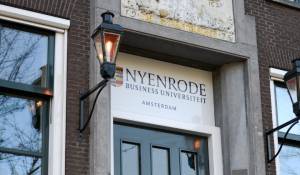Each year, many students are interested in studying an MBA in Finance. And why not? Strictly in terms of salaries, there are very few job paths that are more lucrative than a post-MBA career in finance or financial services. Jobs can be found in financial services firms (such as J.P. Morgan), as well as in credit unions and banks.
An MBA in Finance can address specific issues related to these career paths. A Finance MBA program's typical curriculum may include classes in macroeconomics, corporate finance, global economics, financial markets, and derivatives. These courses provide a comprehensive understanding of the financial landscape, preparing graduates to tackle complex financial challenges.
It’s worth noting that those who are interested in pursuing a career in finance after their MBA may not need to specialize in the topic, as most accredited MBA programs will cover finance topics in their core curriculums. However, those who are looking to transition into the financial services career after their MBA often consider studying in financial hubs, such as New York, London, or Hong Kong. These locations offer unique opportunities for networking, internships, and exposure to leading financial institutions.
Post-MBA positions in financial services can include everything from a risk management specialist to a financial analyst or even an asset manager. For students interested in this area of business, many business schools offer MBAs in Finance, as well as in related fields like Accounting and FinTech. These specialized programs can provide deeper insights and tailored skills that are highly valued in the financial sector.
For a more analytic understanding of finance, some business schools also offer one- or two-year Master of Finance programs. These programs are designed for students seeking intensive, finance-focused education. Students interested in landing financial jobs in non-finance organizations might also want to look into the best MBA programs for Corporate Finance, which combine financial expertise with broader business management skills.
See below for the top 10 MBA programs for Finance or Financial Services, carefully selected based on their academic rigor, employment outcomes, program specializations, and strong alumni networks.

The “Finance and Economics Division” is by far Columbia Business School's largest division, and offers almost half of all the courses at the school. Columbia's proximity to Wall Street means that students don't have to go far to network with financial executives. Of the school’s most recent MBA class, almost 36 percent of students went into roles in the financial services industry (including investment banking, hedge funds, private equity firms, and other parts of the industry).
View School Profile
In any particular year, up to 40 percent of MBA graduates go into the financial industry. Finance-minded students can choose to pursue Booth's long-standing Finance concentration, or drill deeper into the theories with a unique specialization in “Analytic Finance,” which is STEM-eligible. Booth’s Fama-Miller Center produces a range of research in financial topics and ensures that the school’s curriculum stays up-to-date.
View School Profile
Where some MBA programs offer a single specialization in finance, NYU Stern offers five, including one in Quantitative Finance, and another in Financial Technology—“FinTech”—that was launched in 2016. Students regularly go on to land finance jobs with the Federal Reserve Bank and Nomura Securities, as well as into a wide range of corporate finance roles. Almost 30 percent of the most recent MBA class went into careers in financial services, in industries like investment banking and private equity.
View School Profile
Of Wharton's most graduating MBA class, over 36 percent of graduates went into financial services companies, including large firms like JP Morgan, Credit Suisse, and Goldman Sachs. A growing percentage has also been going into firms specializing in financial technology—FinTech—as well. MBA students can choose to pursue the school's popular concentration in Finance and build a network through its Finance Club.
View School Profile
In any given year, up to 40 percent of the school’s MBAs go into the financial services sector, usually the highest rate of all the Canadian business schools surveyed by FIND MBA. Finance-minded students can pursue an MBA specialization in Finance or choose to pair their MBA program with a Master of Finance. In recent years, Queen’s MBAs have been snapped up by firms like Bank of America Merrill Lynch, Capital One, and Credit Suisse, among other firms.
View School Profile
A Tube ride away from the London Stock Exchange, London Business School is at the heart of one of the world's most active financial centers. The school offers a robust range of finance electives, including classes in derivatives and hedge funds. Over one-quarter of the most recent class of graduating LBS MBAs went into finance-related industries. Goldman Sachs and citi are among the school’s top recruiters.
View School ProfileThe past couple decades have seen a gradual opening-up of the Chinese financial system, and this coupled with unbridled economic growth has encouraged the development of a strong financial industry. Guanghua, with its Beijing location and some specialized curriculum, is in a good position to land grads in this growing field. In recent years, over 35 percent of the Guanghua MBA cohort has gone into the finance sector
View School Profile
Almost 40 percent of the most recent HKUST MBA class went into the financial services industry, landing jobs in firms like JPMorgan Chase, Citibank, Credit Suisse, and others. While the core MBA curriculum touches on corporate finance, students can delve further into the subject through electives like “Venture Capital and Private Equity,” “Investment Analysis,” and more. Hong Kong is a great place to be for those looking to network in Asia’s financial industry.
View School Profile
Hong Kong—one of the world’s financial centers—is a great place to do an MBA in Finance. As part of the program, students can also study for four months in other financial centers like New York or London, with partner schools LBS and Columbia. In recent years, over 30 percent of graduating MBAs have gone into the financial services industry, many landing jobs in some of Hong Kong’s biggest financial firms.
View School Profile
Over the past few years, Frankfurt has become a destination for some banks and other financial services company fleeing London, amidst the uncertainty of Brexit and the Covid pandemic. This is good news for finance-minded MBAs graduating from the Frankfurt School of Finance & Management, who now may have more job possibilities as a result. In recent years, over one-quarter of the MBA cohort from the school has gone on to finance roles.
View School ProfileRelated MBA News
The Financial Times Updates Master in Finance Rankings for 2021
Jun 29, 2021
Related Articles
The 5 Most Hireable and Best-Paying MBA Specialties
Jul 19, 2024
An MBA program can be a fast ticket to the top, equipping students with essential business knowledge and leadership skills, making them highly desirable in the job market. These MBA specialties are becoming particularly hireable and well-compensated.
Post-MBA Careers in Finance: Fintech Options Grow
Mar 06, 2019
As machine learning and blockchain technology change the face of finance, business schools must keep pace with their MBA degrees
MBA Careers in Finance: Where Are the Opportunities?
Mar 28, 2018
The doors are open to MBAs in finance, including fintech, wealth management and venture capital
Finance MBA Programs Seek to Retain Appeal Despite Downturn
Jun 17, 2010
In today's economic climate, is now the right time for a finance-focused MBA or MSc?














